Research Briefs and Reports
Data-Driven Research about Northern Virginia
The Community Foundation produces data-driven reports to better understand the needs of the region. These studies provide thoughtful insight into how these needs are addressed in Northern Virginia, and how philanthropic efforts can be targeted to better serve our friends and neighbors. Read our full reports or executive summaries which highlight our key findings.
September 24, 2025
Northern Virginia’s Nonprofit Sector: Essential, Evolving, and Under Pressure
Northern Virginia’s nonprofit sector is more than a network of service providers—it is a cornerstone of the region’s economic and social infrastructure. These organizations create jobs, drive innovation, and deliver critical services that support upward mobility, community well-being, and regional resilience. In fact, the sector generates more than $1.6 billion in annual economic activity, underscoring its vital role in the region’s economy.
March 25, 2025
Fifteen years ago, the Community Foundation for Northern Virginia released its first-ever data-driven report on the region’s youth, offering a snapshot of the challenges and opportunities shaping their lives. Today, those children are young adults navigating a vastly different landscape—one marked by evolving economic pressures, shifting workforce demands, and new concerns around health and safety. With this 2025 report, we revisit the data to understand how Northern Virginia’s youth have grown and what their experiences reveal about the future of our region.
August 27, 2024
In alignment with our strategic priority to improve social and economic mobility in Northern Virginia, the Community Foundation for Northern Virginia (Community Foundation) has embraced the growing momentum towards trust-based philanthropy in our grantmaking. Developing trust with community takes time and resources that are not typically prioritized in program-specific grants. Our trust-based approach to grantmaking has allowed nonprofits to support programs or initiatives that foster deeper community engagement. Over a three-year period, the Community Foundation’s Lamond Fund to Benefit Children and Youth invested $200,000 in United Community through unrestricted, multi-year grants. With these unrestricted funds from the Community Foundation, United Community pursued an innovative, theory-based Lived Experience Consultants (LEC) initiative to understand the community along the Route 1 corridor in Alexandria and Fairfax County, helping build trust and provide deeper access to community supports. The LEC initiative demonstrated impact on LEC participants, the community, and United Community, itself.
February 12, 2024
Trust is critical for social cohesion and economic growth, yet only a quarter of Americans say that most people can be trusted. Americans’ belief that others can be trusted has reached a historic low, declining 47 percent from 1984 through 2022. Northern Virginia is not immune to these national trends. Our Insight Region® Report revealed that social trust in Northern Virginia reached a 5-year low in 2022. Only 33% of Northern Virginian’s believed that most people could be trusted. In the past 3 years, Northern Virginian’s belief that others will be helpful declined 18 percent.
September 11, 2023
In 2019, worker mental health represented a salient but relatively uncommon issue for Northern Virginia employers: approximately 11 percent of working adults were experiencing mild anxiety or depression, and 7 percent fell into a clinical range. During the pandemic, these rates spiked, and have remained high. As of May 2023, over half of the workforce was experiencing some level of anxiety or depression, and a quarter were in the clinical range— requiring some level of treatment or intervention. This research estimates that since 2020, Northern Virginia has lost $8 billion each year in unrealized economic output due to the impaired mental health of its workforce: a quadrupling of losses seen prior to the pandemic.
August 22, 2023
In 2021, one in five families (20 percent) in Northern Virginia did not earn enough money to meet their basic needs for shelter, food, medical care, and other essentials. An additional nine percent could not cover these basic needs, and pay for childcare. All told, 29 percent of the region’s families were struggling with income inadequacy. To cope with rising costs, families at all income levels are changing their habits. The majority of families are cutting back on discretionary spending. Nearly half of families at all income levels have compromised their financial health, including taking on more debt, and getting behind on bills. More than a quarter were sacrificing a basic need, such as delaying medical care, keeping their homes at an unsafe temperature, or going hungry.
Growing Old Together In Northern Virginia: The Family, Homes, and Budgets our Region Needs as we Age
March 23, 2023
As of 2020, there are 310,000 adults aged 65 or above in Northern Virginia, an increase of 61 percent since 2021. This report investigates systemic issues of housing, budgeting, and long-term care that people over 65 in the region face, offering three framing questions of what roles the nonprofit sector, from foundations to community programs and others can play in addressing these critical issues:- How do we make it easier to be a caregiver?
- How do we increase the supply and affordability of senior housing?
- How do we help individuals afford to age in place?
DOWNLOAD THE REPORT
January 31, 2023
This report discusses the mental health needs of Northern Virginia’s youth, which have only increased since 2020. The 2022 Virginia School Survey of Climate and Working conditions shows that one in ten high school students have seriously contemplated suicide in the past year, while one in three have symptoms of recent clinical anxiety.Two other major findings include: Girls, those who identify as LGBTQ+, older students, and Hispanic and Latino students are among those who are experiencing the largest increases in mental health need since the beginning of the pandemic. At the same time, many students do not get enough sleep, a symptom of poor mental health as well as a contributing factor.
DOWNLOAD THE REPORT
September 15, 2022
2022 Champions for Accountability
An Initiative to Highlight the Importance of Diversity, Equity, and Inclusion in Northern Virginia's Workplaces
This report highlights more than 50 employers in Northern Virginia that have taken a crucial first step towards corporate diversity: they are willing to collect, share, and act on data about the demographic composition of their owners, senior staff, and boards. The report summarizes preliminary findings from the first cohort of badge recipients- "Champions-" who submitted a complete application in the spring-summer of 2022. While just the first step, this puts the region on an important pathway to diversifying our leadership and acknowledging where we are, as a region, and as employers.
DOWNLOAD THE REPORT
March 15, 2022
Finding Our Way Back to Mental Health
The Need for Accessible, Affordable Treatment in the Midst of Collective Trauma
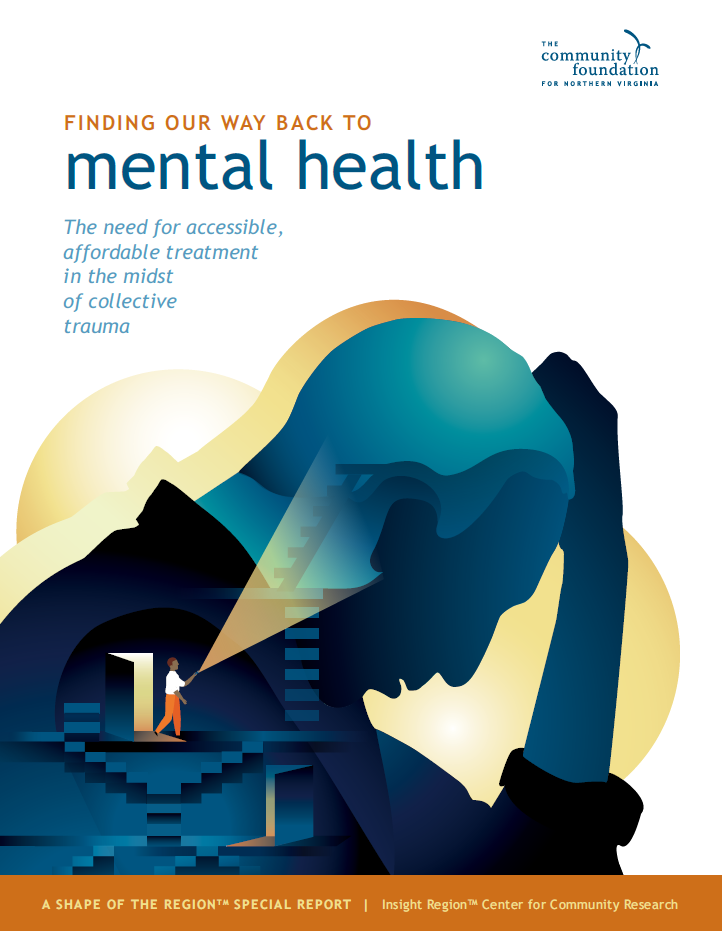 In 2019, about 8 percent of the population was dealing with “active symptoms” of anxiety or depression. Now, that figure is 28%, a fourfold increase impacting over a half million adults in Northern Viginia. This doesn’t include some 200,000 adults whose anxiety and depression levels are transient, but have received, or sought to receive medication or talk therapy in the previous four weeks. In total, whilst 750,000 adults in Northern Virginia have mental health needs, 370,000 who want therapy or counselling are unable to get it.
In 2019, about 8 percent of the population was dealing with “active symptoms” of anxiety or depression. Now, that figure is 28%, a fourfold increase impacting over a half million adults in Northern Viginia. This doesn’t include some 200,000 adults whose anxiety and depression levels are transient, but have received, or sought to receive medication or talk therapy in the previous four weeks. In total, whilst 750,000 adults in Northern Virginia have mental health needs, 370,000 who want therapy or counselling are unable to get it.This report investigates four systemic barriers to people getting the care they need, offering recommendations on how Northern Virginia can work to support this large group of people by addressing systemic barriers to treatment, and what the roles the nonprofit sector, from foundations to community programs and others, can play.
DOWNLOAD THE FULL REPORT



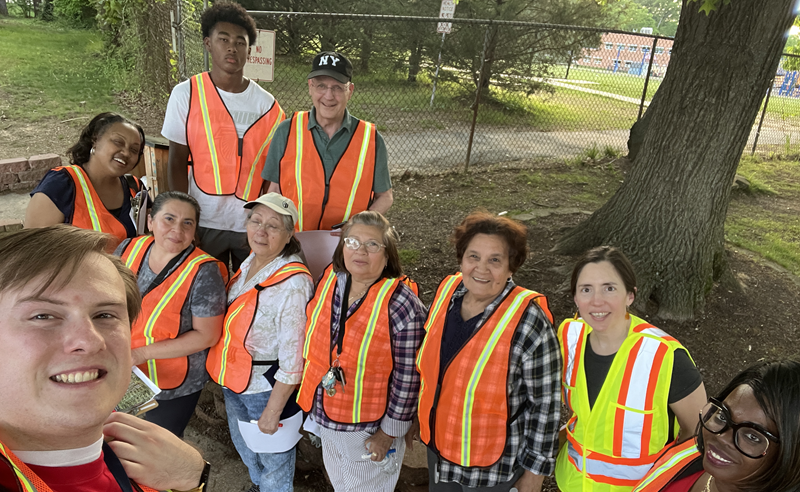
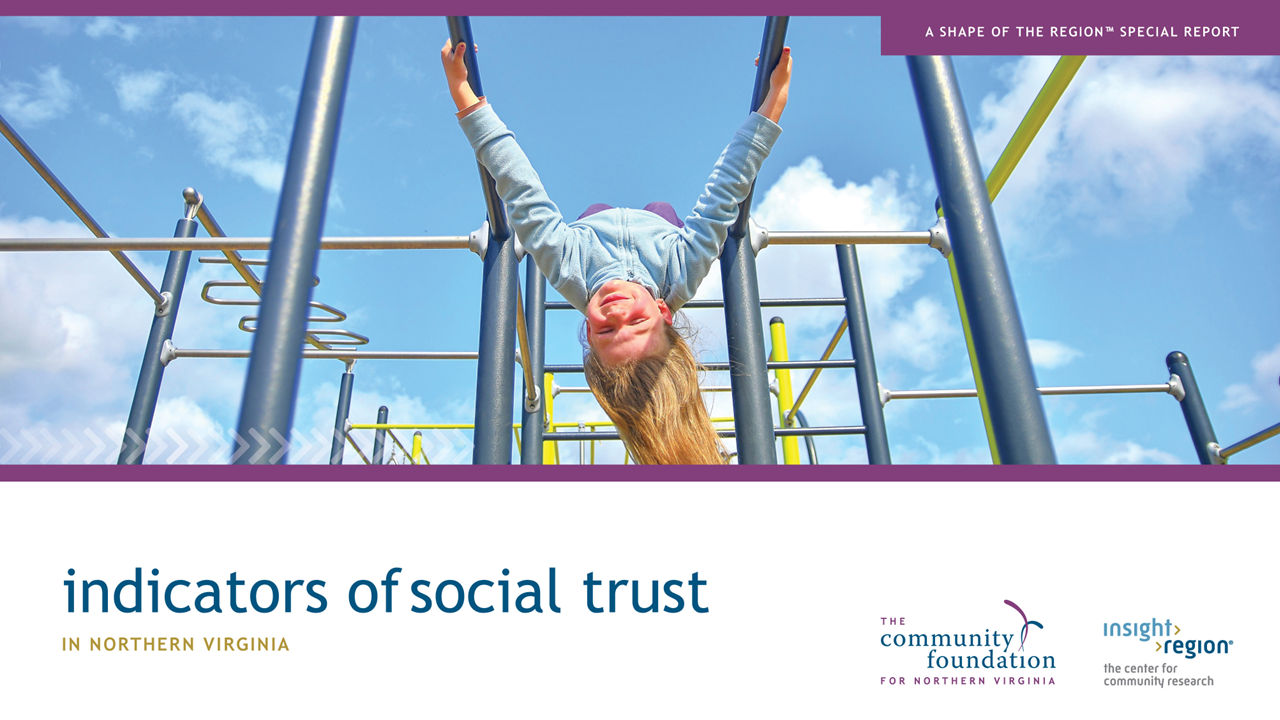
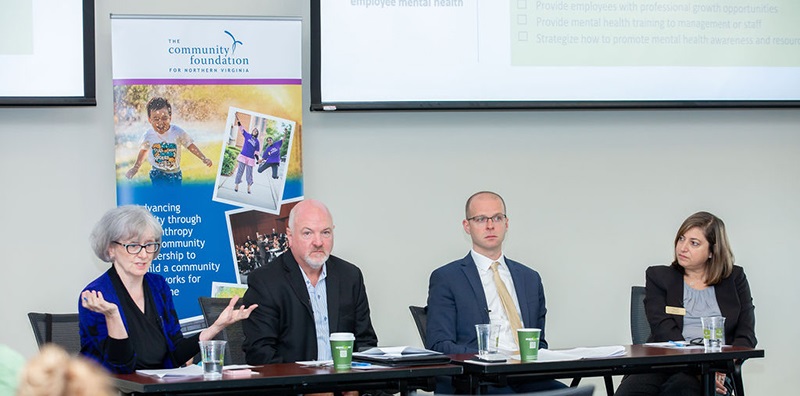


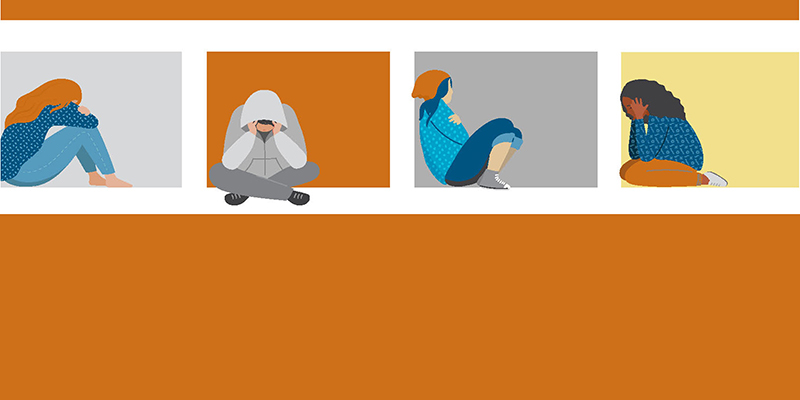
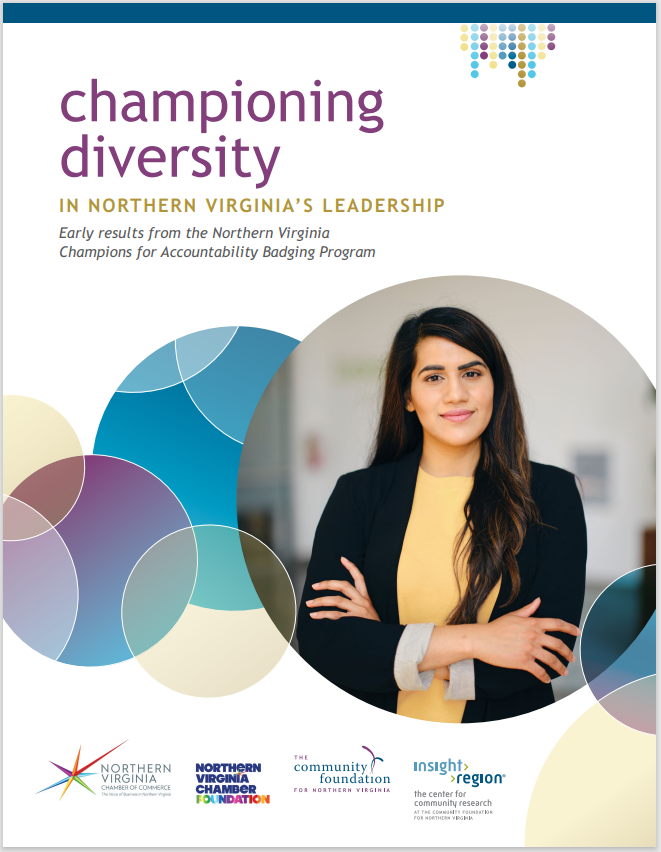
 Questions?
Questions?


